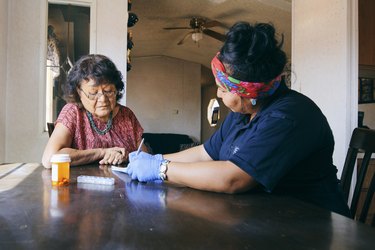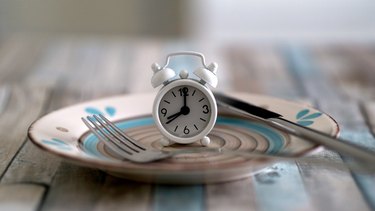
If you're one of the 37 million people in the U.S. living with diabetes, you likely take steps throughout the day to keep your blood sugar in a healthy range.
In addition to morning strategies to manage blood sugar levels, your evening routine can also make a difference.
Video of the Day
Below, six healthy end-of-day habits that can help you prevent a blood sugar spike at nighttime, as well as set you up for success the following day.
1. Embrace an Earlier Bedtime
Experts stress that the number-one step you can take to manage your blood sugar levels at night is simply to prioritize sleep.
"You want to establish a nighttime routine that promotes quality sleep, and try your best to get enough per night," says Anthea Levi, RD, CDN, registered dietitian and founder of Alive+Well Nutrition in Brooklyn, New York.
That's seven to nine hours for adults, for the record, according to the Centers for Disease Control and Prevention (CDC).
That's because if you're not getting enough restorative sleep, your body struggles to use insulin well, according to the CDC. This can lead to a spike in blood sugar levels the following day.
"From a blood sugar perspective, sleep gives your pancreas a break," says Kunal K. Shah, MD, board-certified internal medicine doctor and assistant professor in the Division of Endocrinology at Rutgers Robert Wood Johnson in New Brunswick, New Jersey. "Over the course of the day, it's screaming for a break — we're constantly eating, moving around and generating sugar, and having a good sleep routine is extremely important."
While getting adequate sleep is often easier said than done, do your best to go to bed at a time that lets you clock at least seven to eight hours between the sheets (and perhaps skip scrolling on your phone before bedtime).
2. Try Not to Eat Immediately Before Bed
People who have type 1 or type 2 diabetes and track their blood glucose levels know to expect elevated numbers after a meal. So it should come as no surprise that eating too close to bedtime could spike your blood sugar levels throughout the night.
"If you eat too close to bedtime, you're essentially forcing your pancreas to work overtime," Dr. Shah says. "If your sugar levels are elevated in the evening, they're more likely to be elevated in the morning."
That can be the case for anyone, he says, but it's "100 percent true" for those with diabetes. Over time, this can tax your pancreas further and result in more damage.
For this reason, experts say it's important not to eat immediately before going to sleep — rather, leave at least a few hours between your last meal and bedtime.
"I recommend giving your body about 12 hours between dinner and breakfast the next morning to prevent your blood sugar from spiking right before bed or dropping too low before your morning meal," Levi says.
3. Avoid Sweets or Carbs After Dinner
In addition to spacing out your meals and sleep, experts say it's also important to be mindful of what you're eating at the end of the day.
Levi recommends meals that have a balance of protein, healthy fats and fiber to keep blood sugar levels under control, and she also stresses the importance of avoiding sweets and carbohydrates just before bed.
"When we carb-load right before hitting the hay, we don't have the opportunity to be physically active and get our glucose trending down," she explains.
4. Fit In Some Movement
Many people prefer to exercise in the morning, but even a few minutes of aerobic activity such as walking, running or basic cardio moves like jumping jacks at night can be beneficial. "Movement helps lower blood sugar levels," Levi says.
Indeed, an August 2022 meta-analysis in Sports Medicine found that even light-intensity walking can significantly bring down your blood sugar after you eat.
Just keep in mind that not all exercise is created equal when it comes to lowering blood sugar levels.
Anabolic exercises such as weightlifting actually have the opposite effect, Dr. Shah notes — so it's best to skip those just before bedtime, or else follow a weight-building exercise with a burst of aerobic activity to bring blood sugar levels back down.
5. Brush Your Teeth
Everyone should brush their teeth morning and night, but maintaining good oral health is especially crucial for those with diabetes, per the CDC.
That's because gum disease is both a complication of diabetes as well as a culprit for elevated blood sugar levels.
When you have high blood sugar, you produce less saliva, and it's higher in sugar, too; tooth decay, cavities and gum disease can occur as a result, the American Diabetes Association (ADA) notes.
To keep your mouth healthy, brush your teeth with fluoride toothpaste and floss every night before bed.
And if you notice possible symptoms of gum disease such as swollen or red gums, loose teeth or a dry mouth, let your dentist know right away, and also tell them that you have diabetes.
6. End Your Day on a Calming Note
There's a direct connection between stress and blood sugar levels, Dr. Shah says. That's because when you're stressed, your body enters "fight-or-flight" mode, resulting in an increase of cortisol. This hormone prompts your liver and muscles to release extra sugar into your bloodstream, which in turn causes a blood sugar spike.
So just as it's important to manage stress in the morning — i.e., waking up early enough to avoid having to rush — the same advice holds true at night.
You can keep your evenings calm by building in time for an end-of-day meditation or yoga practice, reading a book or listening to relaxing music.
Dr. Shah also recommends doing your best to avoid overstimulation both in the morning and at night, because too much stimulation can cause a rise in cortisol levels. This might include minimizing screen time or keeping noise levels down in your house to help you wind down.
- Centers for Disease Control and Prevention (CDC): "10 Surprising Things That Can Spike Your Blood Sugar"
- Centers for Disease Control and Prevention (CDC): "How Much Sleep Do I Need?"
- Centers for Disease Control and Prevention (CDC): "Diabetes and Oral Health"
- American Diabetes Association (ADA): "Diabetes and Gum Disease: A Two-Way Street"
- Diabetes Teaching Center at the University of California: "Blood Sugar and Stress"
- Centers for Disease Control and Prevention (CDC): "Monitoring Your Blood Sugar"
- Mayo Clinic: "Diabetes"
- Diabetes Research Institute: "Diabetes Statistics"
- Sports Medicine: "The Acute Effects of Interrupting Prolonged Sitting Time in Adults with Standing and Light-Intensity Walking on Biomarkers of Cardiometabolic Health in Adults: A Systematic Review and Meta-analysis"
Is this an emergency? If you are experiencing serious medical symptoms, please see the National Library of Medicine’s list of signs you need emergency medical attention or call 911.





